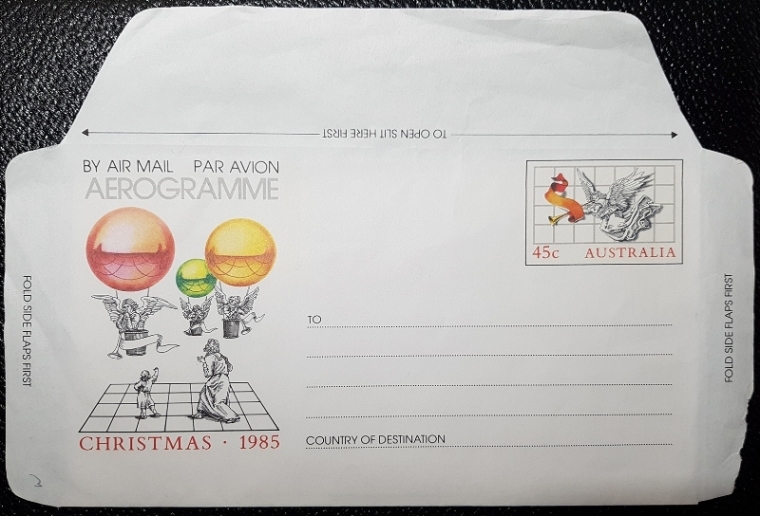
What would I say about the year 2020 in a letter to the future?
The writing of letters is much less common in the 2000s. We don’t often put pen to paper. I’m old enough to remember ‘real’ letters. Some were on very thin paper that folded up into an envelope – they were called aerogrammes. And friends who lived not far away would write newsy letters on lined paper, sealed in a small stamped envelope. There used to be such a thing as stamp collecting!
You hear of people with a terminal illness who write a letter to their child, perhaps to be opened at a significant date when the child is older. Some people include letters with their will. (It’s fascinating what is held in solicitors’ safes, awaiting revelation after a person’s death.)
This set me wondering. If I were to write a letter to be opened in the future, describing my life in 2020, perhaps it might go like this.
Dear Reader,
If you are reading this letter, it means that you are alive and have been blessed that God has brought you through a most extraordinary time. To say that the year 2020 was the strangest time is an understatement.
Our new year got off to a very bad start. We had a dreadful summer over 2019–20. Great swathes of farmland and forest in Eastern Australia were devastated by fires of an unbelievable intensity. Houses, properties, livelihoods, infrastructure – all gone. Millions of native birds and insects and animals died – millions.
Then just when we all felt able to breathe again, there came a mysterious new virus: named COVID-19. It started slowly at first, not sure exactly when, in a far-off land and then spread as quickly and unpredictably as the fires. Right across the world. Whole cities, entire countries went into lockdown with citizens confined to their homes, sometimes alone, and afraid.
People were very afraid. Suspicion, mistrust, selfishness, filled their hearts and minds. Rumours abounded. Conspiracy theories were off the scale. The blame-game ramped up several notches. Panic drove some of us to hoard food and supplies. Here, shoppers went crazy over toilet paper.
Everything except the essentials shut down. Our concerts were cancelled; museums, festivals, conferences, church services – all stopped. In fact, we couldn’t have gatherings of any kind. Even funerals and weddings were restricted to the barest minimum of attendees. We ‘attended’ one funeral online. Life was awkward, frightening. Not to mention bewildering.
But ...
There were some good things. One of these was a prevailing stillness. Traffic noise lessened. We were not rushing about to get to wherever. The air smelled cleaner and fresher – no traffic fumes. We have re-fuelled the car just twice since March – a considerable saving! Air travel worldwide has decreased by 90 percent and cruise ships virtually stopped. We won’t be seeing the UK family anytime soon, sadly. But the atmosphere and the oceans have had considerable respite from pollution.
Some things were set up very quickly, like remote schooling and working from home. Radio and tv presenters worked from home, with ‘studios’ in the spare room. In at least one case this was in a broom cupboard. (Big brooms?) Online shopping really did go ‘viral’, as they say, and I must admit I do like having the groceries delivered. The local shops are worth supporting and we have set up a Friday night tradition of takeaway – not just the usual ‘greasies’ but meals from the smaller local places that offer great value with nutritious food. We figured we want them to stay in business and if takeaway is their only option for a while, we can help support that.
Another good thing was the internet. Zoom and Skype have been round for ages but suddenly we’re doing lots of things this way. Chats with the grandies, church, meetings, seminars, exercise sessions, coffee mornings – just about anything can ‘Zoom’. Of course, nothing beats face-to-face and the screen barrier is a bit constraining, but it can save so much time. No need to dress neatly, drive for half an hour, find a park and pay the meter, then drive home again – all for a one hour meeting in the city! Much better use of precious time.
Possibly the best thing that came out of this is the sense of community. People of all faiths and none looked out for one another. On the permitted 1-hour-a-day walk – with your dog, optional –people smiled, said ‘G’day’ and meant it when they asked ‘How’s it going?’ Casseroles and cakes were left on doorsteps, there were offers to do shopping or to drive elderly neighbours to medical appointments.
So yes, there are bad things happening and as I write this letter Melbourne has returned to lockdown for six weeks and the Victorian border with NSW is closed for the first time in 100 years. But there’s so much good that is happening too, as people help each other. Not everyone, but most people are kind and compassionate.
We all long to return to normal, but I pray that it will be a ‘new normal’, that we can take some of the good things out of this time of pandemic.
And so, dear Reader, Let’s not forget where God has been in all this. He didn’t send this as a punishment, but perhaps we could take it as a prompting to give Him thanks for the world that He has created and given to us to tend wisely. We humans are complex creatures. We can be good and bad, loving and mean, greedy and generous, compassionate and selfish. Sometimes all at once!
But however complicated we are, God still blesses us and His grace is often overwhelming.

Sheelagh Wegman is a freelance writer and editor. She is in the community of St David’s Cathedral in Hobart and lives in the foothills of kunanyi/Mt Wellington.
Sheelagh Wegman’s previous articles may be viewed at http://www.pressserviceinternational.org/sheelagh-wegman.html